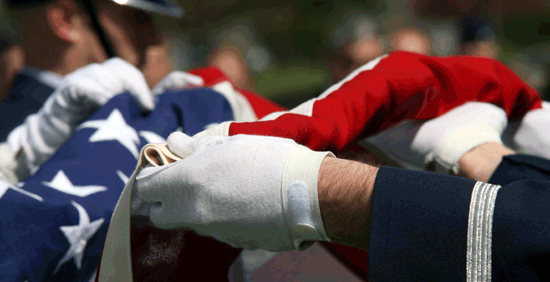
DISCIPLESHIP:
BRING IT HOME
|
|
For more than 30 years, I have listened to a composition of 24 musical notes simply referred to as “Taps.” I first remember hearing this medley as a young Marine when it sounded at 10 p.m., laying us to rest after a long and difficult day of training. These simple notes of music contained no words, but the sound of the bugle invited you to release the day’s struggles and hope for a better day. My appreciation of “Taps” is different now because I have a greater understanding of its history and meaning as an Army chaplain.
“Butterfield’s Lullaby” or “Taps,” as we know it today, was composed after seven days of bloody fighting on the banks of the James River in 1862, during the Civil War. Brigadier General Daniel Butterfield summoned his bugler to his tent on a hot, humid July evening in order to perfect a fitting tribute to his men, both alive and dead. After some minor changes to his original notes, Brigadier General Butterfield and his bugler, Private Oliver Wilcox Norton, presented “Taps” that evening as a tribute to his soldiers and to acknowledge their suffering.
Imagine a time when the only thing that could be heard over the sounds of battle was the sharp, clear, and unmistakable tones of a bugle or trumpet. The confusion of battle causes fear. A soldier’s vision becomes impaired because of the smoke and flash of battle and even the most highly trained warrior can become disoriented. The bugle served as a battlefield radio, blaring out the orders from the commander.

We find the trumpet being carried into battle throughout Scripture to relay orders and communicate strategies. If the trumpet makes an uncertain sound, a soldier might not prepare himself for battle (1 Corinthians 14:8).
One of the greatest privileges of serving as an Army chaplain is to be with the soldiers you serve wherever they go. Whether training during a field exercise or deployment to a combat zone, the chaplain goes where his soldiers go. You experience your congregation’s ups and downs, just like a pastor serving a local church. You are with your soldiers when they hurt, and you are there when they celebrate.
A chaplain leads soldiers to Christ, performs wedding ceremonies, stands by them in the hospital, rejoices with them, and cries with them. At times, a chaplain delivers the final message of comfort to a grieving family as their loved one—an American soldier who has paid the ultimate price of sacrifice in the defense of his country—lies in front of them in a flag-draped coffin. As family members grieve, and comrades stand saluting, “Taps” is played as a final farewell and show of honor. This sacred ritual brings the strongest of warriors to tears as they honor a fallen comrade by laying him, or her, to rest from the struggles of battle.
There will be one final trumpet call for those who trust in Christ as the ultimate victor. It will raise the dead in Christ and snatch up those of us “who are alive and remain” to be with Him in the clouds. We will put on immortality and rest from the battles of life. Unlike “Taps,” this trumpet call will signal the beginning of eternal life, not the end. This trumpet call will rally the soldiers of Christ to a place He has prepared for us, and we will enjoy a victory celebration like no other.
I have witnessed some joyful reunions when soldiers return home to greet their loved ones after serving in a combat zone. But the victory celebration we will have with Jesus will be the ultimate homecoming celebration!
I hope that when you hear the notes of “Taps” sounded at a military funeral, you will honor that person who gave themselves so you may live free in our great country. But keep listening, because in a moment—in the twinkling of an eye—the last trumpet will sound (1 Corinthians 15:52) and we will meet our Lord above the battlefield.
About the Writer: Chaplain (LTC) Terry Austin, US Army, is currently stationed at
Fort Belvoir, VA. Read more about Free Will Baptist chaplains at www.homemissions.net.
|
|

